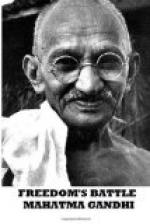Freemasonry is a secret brotherhood which has more by its secret and iron rules than by its service to humanity obtained a hold upon some of the best minds. Similarly there seems to be some secret code of conduct governing the official class in India before which the flower of the great British nation fall prostrate and unconsciously become instruments of injustice which as private individuals they would be ashamed of perpetrating. In no other way is it possible for one to understand the majority report of the Hunter Committee, the despatch of the Government of India, and the reply thereto of the Secretary of State for India. In spite of the energetic protests of a section of the Press to the personnel of the committee, it might be said that on the whole the public were prepared to trust it especially as it contained three Indian members who could fairly be claimed to be independent. The first rude shock to this confidence was delivered by the refusal of Lord Hunter’s Committee to accept the very moderate and reasonable demand of the Congress Committee that the imprisoned Punjab leaders might be allowed to appear before it to instruct Counsel. Any doubt that might have been left in the mind of any person has been dispelled by the report of the majority of that committee. The result has justified the attitude of the Congress Committee. The evidence collected by it shows what lord Hunter’s Committee purposely denied itself.
The minority report stands out like an oasis in a desert. The Indian members deserve the congratulation of their countrymen for having dared to do their duty in the face of heavy odds. I wish that they had refused to associate themselves even in a modified manner with the condemnation of the civil disobedience form of Satyagraha. The defiant spirit of the Delhi mob on the 30th March 1919 can hardly be used for condemning a great spiritual movement which is admittedly and manifestly intended to restrain the violent tendencies of mobs and to replace criminal lawlessness by civil disobedience of authority, when it has forfeited all title to respect. On the 30th March civil disobedience had not even been started. Almost every great popular demonstration has been hitherto attended all the world over by a certain amount of lawlessness. The demonstration of 30th March and 6th April could have been held under any other aegis us under that of Satyagrah. I hold that without the advent of the spirit of civility and orderliness the disobedience would have taken a much more violent form than it did even at Delhi. It was only the wonderfully quick acceptance by the people of the principle of Satyagrah that effectively checked the spread of violence throughout the length and breadth of India. And even to-day it is not the memory of the black barbarity of General Dyer that is keeping the undoubted restlessness among the people from breaking forth into violence. The hold that Satyagrah has gained on the people—it may be even against their




